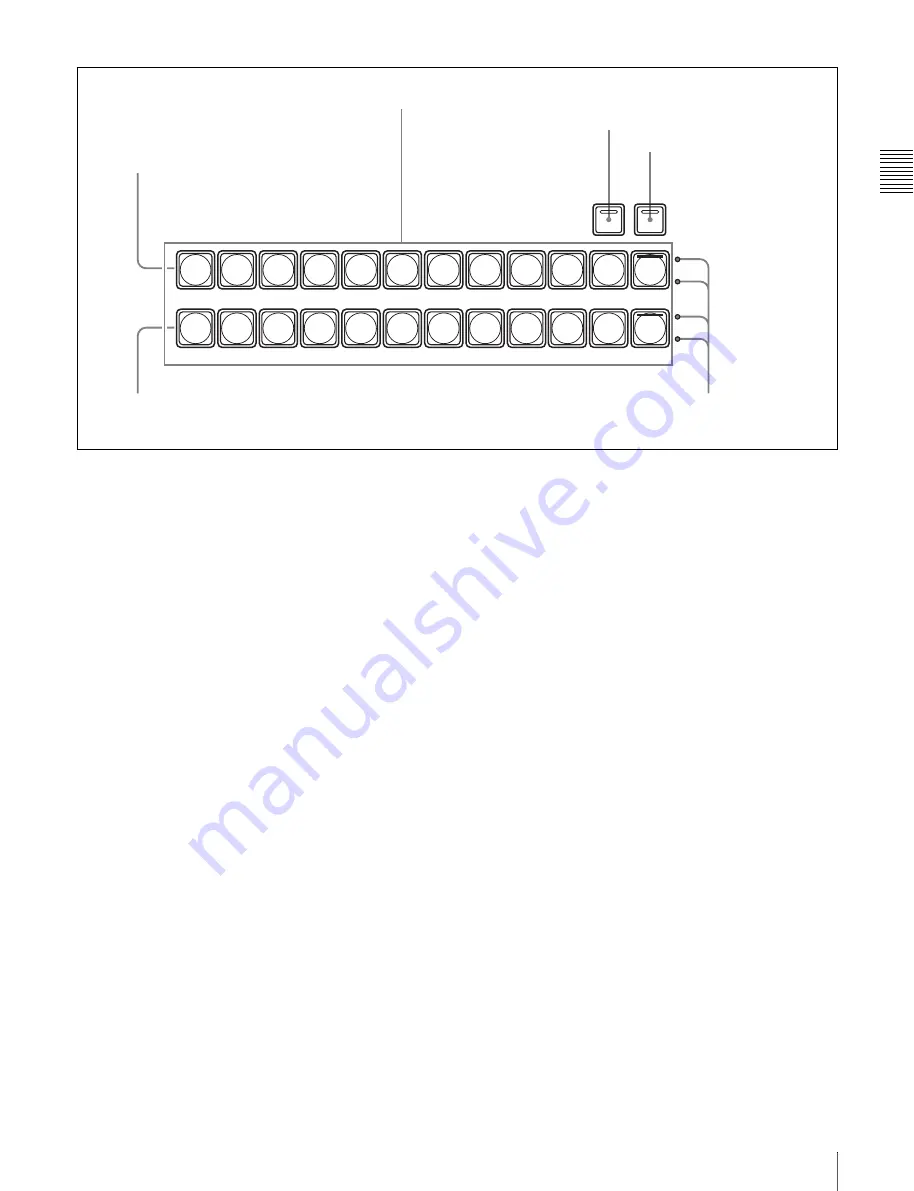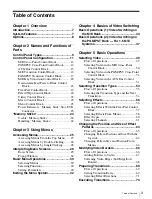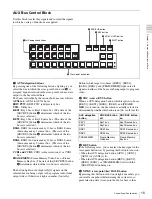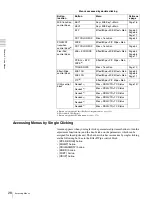
C
h
ap
te
N
a
me
s
an
d
Fu
nc
ti
on
s o
f P
a
rts
13
Control Panel Configuration
a
Cross-point button rows
Select background video by pressing the corresponding
button.
The buttons in the background A row select the
background video which is output before the start of a
transition (A bus video). Pressing a button selects the
signal assigned to that button (input signals to the IN1 to
IN16 connectors
1)
of the processor, or signals which the
processor generates internally). The button lights in red
(high tally) if the selected signal is being output to the
program video (final output video). Otherwise it lights in
amber (low tally).
1) The MKS-2110M Input/Output Connector Board must be installed to use
the IN9 to IN16 connectors.
The buttons in the background B row select the
background video which is output after a transition (B bus
video). The button lights in red (high tally) if the selected
signal is being output to the program video. It lights in
amber (low tally) if the selected signal is not being output
to the program video.
In addition to the operating mode described above (flip-
flop mode), you can also select bus fixed mode. In bus
fixed mode, the signal selected on the background A row
is always output when the fader lever is at the top, and the
signal selected on the background B row is always output
when the fader lever is at the bottom.
For more information about bus fixed mode, see “Setting
the Bus Toggle On or Off” (page 174).
The buttons in the A row and the B row select the same
signals. For example, the fifth button from left in the A row
selects the same signal as the fifth button from left in the B
row.
You can use the Xpt Assign menu to freely change the
assignment of signals to cross-point buttons.
For details, see “Assigning Signals to Cross-Point Buttons
(Operation Menu)” (page 156).
Cross-point button numbers
On the 1 M/E panel and the 1.5 M/E panel, there are 12
cross-point buttons in each row. On the 1.5 M/E wide
panel, there are 20 cross-point buttons in each row. These
buttons are numbered 1 to 12 or 1 to 20 from the left side
of the panel. Pressing the [SHIFT] button
3
to turn the
shift function on makes more cross-point button numbers
available: numbers 13 to 24, or 21 to 40. This manual
refers to the buttons available when the shift function is on
as “shift side buttons,” and to the buttons available when
the shift function is off as “non-shift side buttons.”
See page 156 for more information about cross-point
button numbers.
b
XPT (cross-point) HOLD button
By pressing this button to turn it on (it lights in amber), you
can recall a snapshot while retaining the current cross-
point button selection state. (The cross-point selection
information in the snapshot is ignored.)
c
SHIFT button
Press this button, turning it on, to use the cross-point
buttons as shift side buttons. Press it again, turning it off,
to use the cross-point buttons as non-shift side buttons.
BLACK
COLOR
BKGD
BLACK
COLOR
BKGD
M/E
B
A
XPT
HOLD
SHIFT
Background A row
1
Cross-point button rows
Background B row
2
XPT HOLD button
3
SHIFT button
4
Tally indicators
Summary of Contents for MFS-2000
Page 6: ...6 Table of Contents ...
Page 136: ...Chapter 6 Advanced Operations 136 Copying ...
Page 192: ...192 Other Settings Chapter 9 System Settings ...
Page 198: ...198 Index Index ...














































